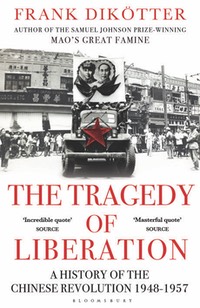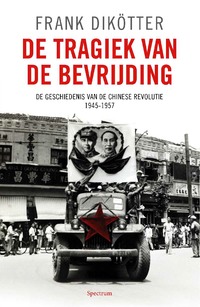(reviews are listed chronologically, with the most recent one at the top; click the name of the newspaper or journal to read the full review)
'it is curious that so many of us still know so little about China's past. Readers and publishers have rarely shown much appetite for it, but there are signs that this is changing. Much of the credit must go to the Hong Kong-based historian Frank Dikötter, who is overturning many of the accepted ideas about China under Communist rule.' - James Owen, The Telegraph, 22 September 2013
'The historian of
China Frank Dikötter has taken a sledgehammer to demolish perhaps the last
remaining shibboleth of modern Chinese history… The
Tragedy of Liberation serves as reminder of the ruinous failure of American (and other)
experts properly to comprehend both the nature of the communist triumph — a
Soviet-backed military conquest — and its disastrous record in government. This
should be recognised as one of the great scandals of academic life, on a par with
the gross overestimation of the Soviet economy during the Cold War.' - Jasper Becker, The Spectator, 14 September 2013
'This book only betters' Mao's Great Famine. - The Economist, 6 September 2013
'Pasth-breaking… We remain in Frank Dikötter's debt.' - Jonathan Mirsky, Literary Review, 1 September 2013
'Remarkable… mainstream academic scholarship must also be revised in the light of Dikotter’s work.' - Michael Sheridan, The Sunday Times, 1 September 2013
'Harrowing…' - Tim Barrett, The Observer, 30 August 2013
'The book is a remarkable work of archival research.' - Julia Lovell, Financial Times, 30 August 2013
'An excellent, angry book… always contained within a framework of impressive research and elegant prose.' - Rana Mitter, The Guardian, 30 August 2013
'A vivid account of the Chinese Revolution… In a cool, dispassionate narrative, Dikötter recounts the orgy of violence Mao and the Communists set loose - and we cannot begin to understand modern China without being aware of the blood-drenched tale he so ably relates.' - Kwasi Kwarteng, The Evening Standard, 22 August 2013
'Tightly written… The book is also a dispassionate study of the way nations can pervert optimism and descend into lunacy by steady increments.' - Leo Lewis, The Times, 19 August 2013
'Dikötter’s Mao’s Great Famine (2010) won the BBC Samuel Johnson Prize for Non-Fiction in 2011, and his prequel is just as well composed and heartbreaking to read…. a vital study of a crucial period of history.' - Publishers Weekly, 4 August 2013
'Dikötter marshals his meticulous research to show how Mao continually set up expectations only to mow them viciously down… Under the “shiny surface” of Mao’s propaganda, the author ably reveals the violence and misery.' - Kirkus, 29 July 2013

